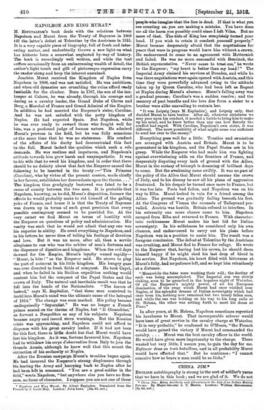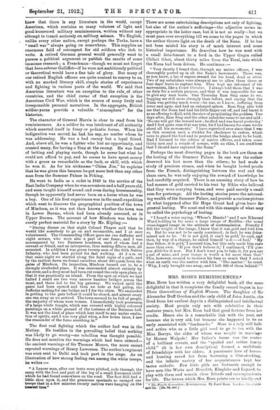CYRTNA ME.*
ENGLISH autobiography is strong tent efaolilierts-yarns
that we 'have in this book ; and we are glad of it. We do not
• China Jim Being Incidents and Adventures in the Life of an Indian Mutiny Veteran. By liapar-General J. T. Harris. London: Witham dieinamann. [Ss. 6d. net.]
know that there is any literature, in the world, except American, which contains so many volumes of light and good-humoured military reminiscences, written without any attempt to trench serionsly,on,militaxy, s,aience. We English, • unlike every other nation, except perhaps the Turks, have a " small war " always going, on somewhere, This supplies an enormous field of retrospect for old soldiers who itch to write. A retired German general would generally want to pursue a political argument or publish the results of some immense research ; a Frenchman—though we must not forget that beausabreur Galliffet—if he were not ambitiously political or theoretical would have a fine tale of glory. But many of our retired English officers are quite content to convey to us, with no marked literary skill, simple stories of experiences and fighting in various parts of the world. We said that American literature was an exception to the rule, of other countries, and the chief cause of that exception is the American Civil War, which is the source of many lively and irresponsible personal narratives. In the aggregate, British soldier-yarns provide a valuable "atmosphere" for the historian.
The character of General Harris is clear to read from his reminiscences. As a soldier he was intolerant of all authority which asserted itself in fussy or pedantic forms. When his indignation was moved...he_ had_ his say, no matter whom he was addressing. He was a had enemy but a loyal friend. And, above all, he was a fighter who lost no opportunity, and created many, for having a. fling at the enemy. He was fond of betting and playing cards, though be never lost what he could not afford to pay, and he seems to have spent money with a grace as remarkable as the, luck, or skill, with which he won it. As for his nickname" China Jim," he explains that he was given this because begot more loot. than any-other man from the Summer Palace in Peking.
He went to India as a cadet in 1849 in the service of the East India Company when he was seventeen and a half years old, and soon taught himself sound and even daring horsemanship, though he apparently had never been on a horse when be was a boy. One of his first experiences was in the small expedition which went to discover the geographical position of the town of Mindoon, as it was not then known whether the town was in Lower Burma, which had been already annexed, or in Upper Burma. The account of how Mindoon was taken is surely perfect material for a story by Mr. Kipling :- " During dinner on that night Colonel Phayre said that he would like somebody to go on and reconnoitre, and I at once volunteered. The Commanding Officer gave me one duffadar and eight sowers' who were also a part of our force; and I was accompanied by two Burmese headmen, each of whom had a. servant or friend, and an interpreter, thus making fifteen men, all mounted. In addition I was given twenty men of the 65th Native Infantry, who had been picked for fast walking. At 2 a.m. on that same night we started along the faint signs of a path, and by the earliest dawn we found ourselves about 400 yards from the gates of Mindoon. On inspection, Mindoon turned out to be a strongly stockaded place. It was surrounded almost entirely by the river, and a deep moat had been cut round the only open place, so that it was praetically an island. From the spot on which we had halted I could see two very narrow bamboo bridges across the moat, and these led to the big gateway. We waited until the gates had been opened and then we rode at full gallop, the duffadar making for one bridge and I for the other. We succeeded in getting to the gate before it could be closed, and almost every one ran away as we arrived. The town seemed to be full of people, the majority of whom were women. Iimmediately took possession of a large white temple, which was covered with highly coloured paintings on a white ground of the tortures of the Burmese hell. It was not the kind of place which lent itself to any undue exalta- tion of spirits, and I was very glad when, a few hours later, I saw the remainder of the force marching in."
The first real fighting which the author had was in the Mutiny. He testifies to the prevailing, belief that nothing was likely to go wrong—no rebellion was thought possible. He does not mention the warnings which had been uttered— the ancient warnings of Sir Thomas Munro, the more recent repeated warnings of Henry Lawrence. The author's regiment was soon sent to Delhi and took part in the siege. As an illustration of how strong feeling ran among the white troops, he writes :- • ' A. Lancer man, after our tents were pitched, rode through the camp with the foot and part of the leg of a small European child which he' had found somewhere on the road. The foot still had a little shcie upon it, and the gruesome speetaele so enraged our troops that in a few minutes twenty natives were hanging on the noseeet-treir."
There are some entertaining descriptions not only of fighting, but also of the author's sufferings—the adjective seems in- appropriate in the latter case, but it is not so really—but we must pass over everything till we come to the pages in which the author throws light on the death of the Nana. If he has not been misled his story is of much interest and some historical importance. He describes how he was sent with a small detachment to a ford in the Upper Gogra called Chilari Ghat, about thirty miles from the Terai, into which the Nana had been driven. He continues :—
" Very shortly I found that, through my native officers, I was
thoroughly posted up in all the Nana's movements. There was, as you know, a lac of rupees reward for his head, dead or alive.
Two of my subandars wore always at me to allow them three or four days' leave to capture him. They kept me informed of his movements, like a Court Circular. I always told them that I was on duty for a certain purpose, and that it was impossible for me to give any man leave. One Thursday Ram Sing came to me, begging me still more strongly than before, and saying that the Nana was getting much worse—he was, as I knew, suffering from fever and ague, and had an enlarged spleen. Ram Sing also told me that the Nana had had his little finger cut off, and had burnt it as an offering to Kali, with the view of propitiating the goddess. Two days after, Ram Sing and the other subandar came to me and said : `No one will get the reward now ; he died and was burnt yesterday.' And I feel quite sure that was true, for I had known for some weeks about all his movements.' I have regretted ever since that I wits on this occasion such a stickler for obedience to orders, which were to guard the ford and to protect the bridge about to be built. Had I listened to the advice of native offieers, and taken some thirty men and a couple of sowers, with an ekka, I am confident that I should have captured the Nana."
Perhaps the most diverting pages in the book are thou) on the looting of the Summer Palace. In one way the author deserved his loot more than the others ; be had made a study of precious stones, and when he bought looted pearls from the French, distinguishing between the real and the sham ones, he was only enjoying the reward of knowledge be had carefully acquired. There is an amusing story of how he had masses of gold carried to his tent by Sikhs who believed that they were carrying brass, and were paid merely a small sum for porterage. All the looting stories prove the astound- ing wealth of the Summer Palace, and provide a curious picture of what happened after Sir Hope Grant had given leave. foal" general looting. We must end with this example of what may be called the psychology of looting.
"I heard a voice saying, Where's Harris?' and I saw Edmund Ward holding in his arms a large image of Buddha—the usual cross-legged image in the attitude of Contemplation. Directly I felt the weight of the image, I knew that it was gold and told him so. But he was not to be easily convinced ; in fact, he was deter- mined not to be. ' It is not gold, it can't be gold,' he said,.and then, by way of a change, he called himself a d—d fool." MT dear fellow, it is gold,' I assured him. but this only made hirasave more than ever. 'If you don't believe it,' I continued, 'I'll give you £500 for it now. But I don't want you to take it, for you Are a pal of mine, and your image is worth a lot more than that.' This, however, seemed to increase his fury so much that I asked what on earth was the matter with him. 'The matter ! ' he cried. Why, I only brought one away, and I left 499 of them behind!'"











































 Previous page
Previous page